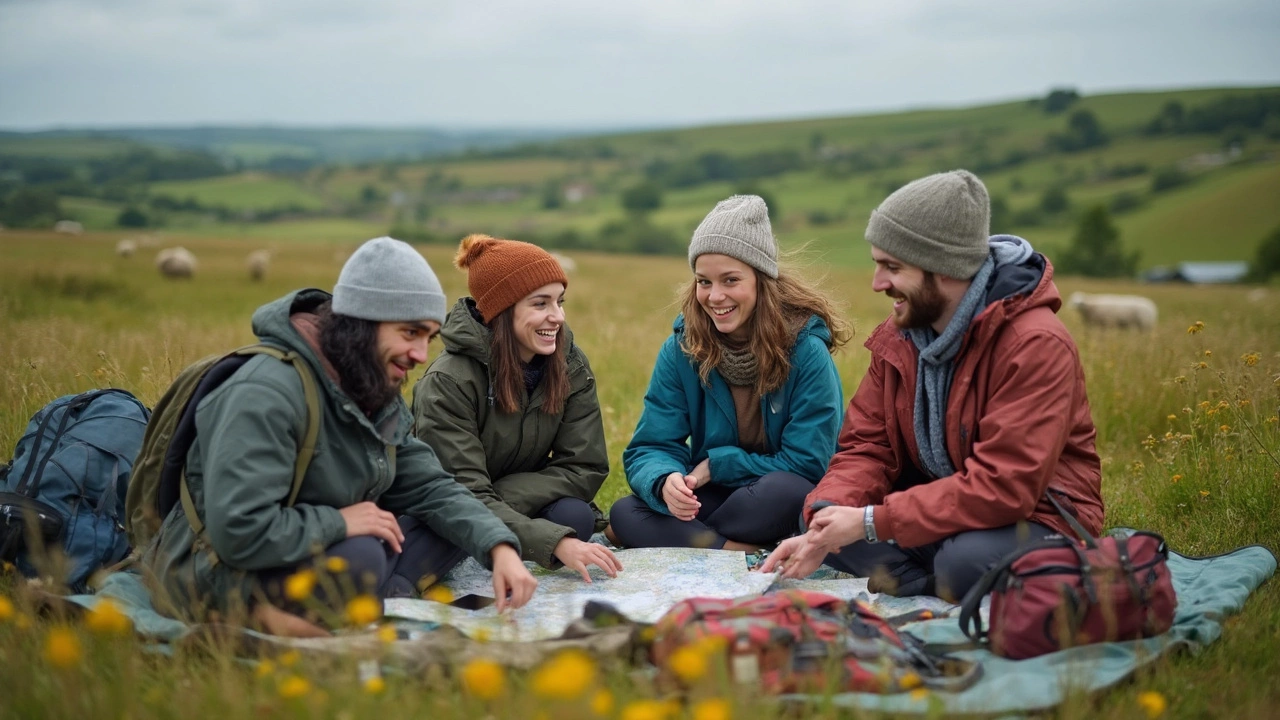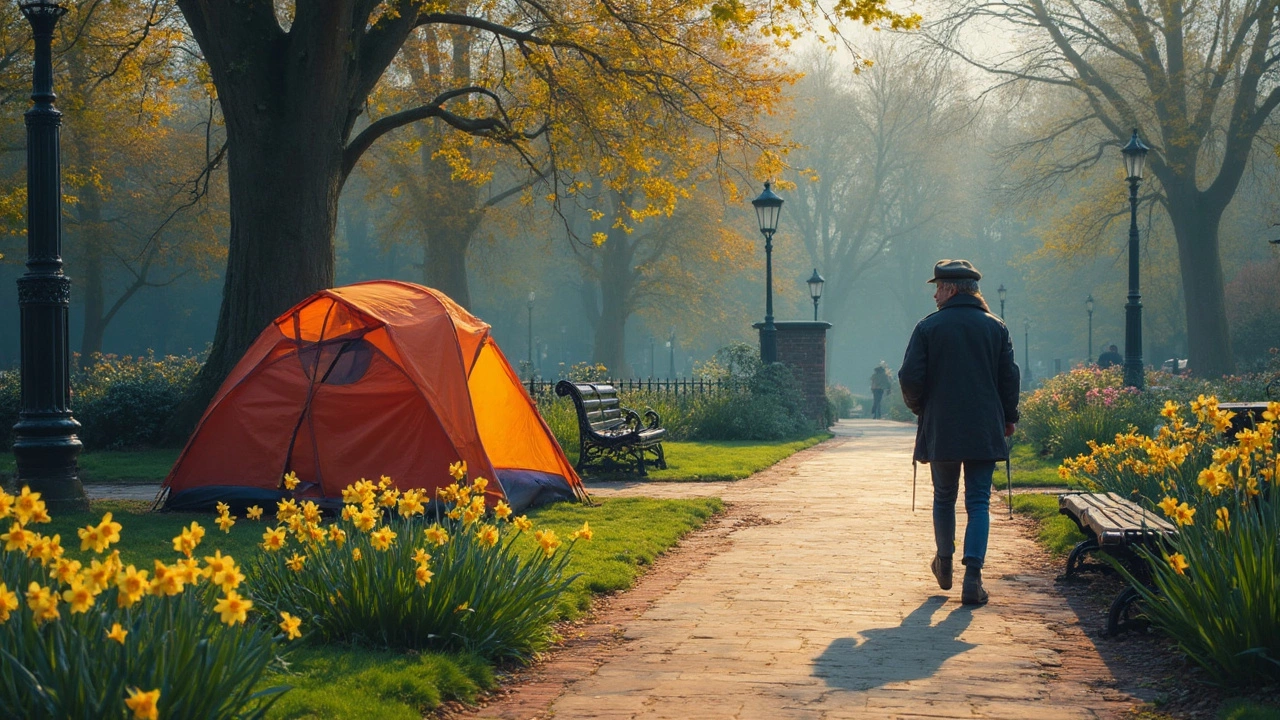You’d think throwing up a tent in the middle of a green city park would be a simple move. Picture it: tired feet from sightseeing, your backpack weighing you down, and the grass promising a soft spot to crash. But as soon as you start unzipping those tent bags in a UK public park, all sorts of questions come up. Are you breaking a law? Is it worth risking a fine just for an adventure under the open sky? Thousands of travelers each year find themselves caught between the urge to camp wild and the maze of British park regulations. Spoiler alert: the rules might surprise you.
The Real Deal: UK Park Camping Laws and Why They Matter
First thing’s first: the UK isn’t exactly wild-camping paradise, at least not in its public parks. While you see tents popping up at festivals and designated campgrounds, public parks are another story. The law comes down, as always, to who owns the land and how it’s managed. Most public parks in the UK are run by local councils, who want these spaces to be enjoyable and safe for everyone. For this reason, almost every city council explicitly bans overnight camping and tent pitching in public parks.
Cambridge City Council made headlines after handing out fines to anyone found camping overnight in their green spaces. London boroughs, like Westminster and Camden, are pretty strict as well, with council officers patrolling and sometimes removing tents. Why the crackdown? Public parks are seen as shared resources, and overnight stays can create hygiene issues, attract anti-social behavior, or damage the grass. Some places have by-laws making it clear: “No person shall camp or erect a tent…without the written permission of the council.” That’s about as blunt as it gets.
It’s not just about irritating the parkies. There can be genuine legal consequences. Fines, removal by security, and even a court appearance in persistent cases. A 2022 case in Manchester saw campaigners’ tents cleared from St. Peter’s Square, sparking debates but ending with police and council backing each other up. So, the short answer to our burning question? You probably can’t get away with pulling out the pegs in most public parks. Knowing that saves you from a lot of potential drama (and a hit to your wallet).
Exceptions, Loopholes, and Where Camping Is Actually Allowed
Alright, so the pessimists will say “that’s it, no camping for you.” But hang on. There are a few notable loopholes and exceptions in the thick of UK camping laws. Don’t expect them in Birmingham’s city parks, but some regions are more chilled. The famous Lake District and parts of Scotland invite wild campers onto certain pieces of land, though – and this is crucial – not usually the classic urban public park you had in mind.
Take Scotland, for instance. Thanks to the Land Reform (Scotland) Act 2003, people have broad outdoors access rights, which means wild camping is allowed on most unenclosed land. Just don’t pitch up in someone’s garden or private croquet lawn. Even in Scotland, there are exclusions like municipal parks, which are still normally off-limits. But the mountains, moors, and even the loch shores of the Highlands are fair game. For English and Welsh campers, the Dartmoor National Park was until recently a rare legal wild camping spot (after some legal wrangling, limited wild camping remains allowed with strict rules).
Occasionally, councils issue temporary permits for charities or festivals, letting groups set up on green spaces. If you absolutely need to sleep in a park for an event, try contacting the park management. Some parks even have “pop-up” campsites for special occasions. Remember, if you’re lucky enough to get a permit, stick to the rules, clean up after, and leave no trace. For the rest of us – unless the sign says otherwise – assume your tent isn’t welcome.
Here’s a little insider tip: Even in “no camping” zones, some seasoned backpackers manage “stealth camping” – setting up late, packing up super early, and leaving the space cleaner than they found it. It’s not without risks (you can still be moved on or fined), but it’s a bit of an unspoken tradition among hardcore hikers and cyclists. Just weigh the risks and have your story ready if approached.

Risks, Repercussions, and How Park Authorities Actually Respond
So what really happens if you do sling up a tent in a London, Manchester, or Cardiff park? The answer depends a lot on where you are, who sees you, and when you’re spotted. Chances are, in the middle of a busy city, someone will clock you quickly. Most local authorities see tents as a red flag: Could be rough sleeping, protest, or unlawful camping. You’ll often get a friendly (or sometimes not-so-friendly) nudge from a park security officer or community warden, telling you to pack up and move on. If you’re polite, most don’t want to start trouble, though repeat offenders or big groups may get fines or even police involvement.
Back in 2023, Bristol made local headlines after clearing a string of tents from Castle Park, calling it a “sensitive welfare operation.” The city’s by-laws include the words: “No person shall camp or sleep in any part of the park,” and that’s the language you’ll find echoed pretty much everywhere. A survey of London councils found almost unanimous bans, though some areas have slightly “quieter” patrols outside of festival season. Don’t be fooled, though – rangers may show up at dawn, especially if there have been complaints from locals or businesses nearby.
For those thinking about trying it anyway, here’s a sobering stat: According to a 2022 BBC report, more than 3,000 fines were issued to people camping illegally in UK parks that summer alone. Sure, not everyone gets caught, but it’s hardly worth a stressful night’s sleep. Besides the fines, you might get your gear confiscated, end up on a “watch list”, or even land in court for repeat offenses.
It’s not all doom and gloom, though. There’s a healthy debate about access to green spaces, especially as city life gets more hectic. As Professor Anna Brown of the University of Westminster put it:
“Urban parks are our breathing spaces – but they’re managed for everyone’s use, not for a select few to camp overnight. Balance and respect are key.”More campaigns now push for “urban wild camping zones,” and there’s talk of relaxing rules in certain low-impact areas. But as things stand today, play by the rules or risk making headlines for the wrong reasons.
Handy Tips If You’re Determined To Camp in the UK (Legally & Responsibly)
Ok, maybe you’re still itching to sleep out. There are ways to get most of that experience legally, with some smart workarounds. First, look at regional national parks or specialised campgrounds dotted all over the UK. The camping in public parks uk rule? Only ever bend it with clear, written permission. National Trust, Forestry England, and local wildlife trusts often have pop-up sites in summer – you’ll get much of the wild feel, minus the risk of security waking you at 5am.
- Plan ahead. If you’re trail hiking or cycle-touring, check Ordnance Survey maps for public land, official campsites, and landowner info. Apps like “Park4Night” help you spot legal options, and local hiking Facebook groups or UKCamping forums are treasure troves of insider info.
- If you try wild camping in Scotland or Dartmoor, follow the “leave no trace” rule. No fires, tiny groups, stay one night, and pitch late/leave early. Keep an eye out for seasonal restrictions, like lambing season or wildlife protection areas.
- Need an emergency camp? If the weather gets dangerous or there’s a real need, authorities are usually understanding – just explain yourself and don’t push your luck.
- Be respectful. Nobody likes stumbling over a tent on their morning jog. Set up well away from main paths, use dark-colored tents, and keep noise to a minimum.
- Most importantly: Don’t leave anything behind. Litter, fire scars, or even a tent peg – just ruins it for everyone else.
And if you just want the vibe without the rule-breaking, try glamping sites, eco-pods, or urban campsites. London has some right in the heart of the city, like Lee Valley – close enough to the wild, but all above board.
Anytime you’re tempted to roll out your tent in a UK park, remember: public parks aren’t wild frontiers, but they’re not concrete deserts either. Knowing the boundaries is half the fun – and keeps your adventure from ending with a fine or an awkward wake-up call from security.
